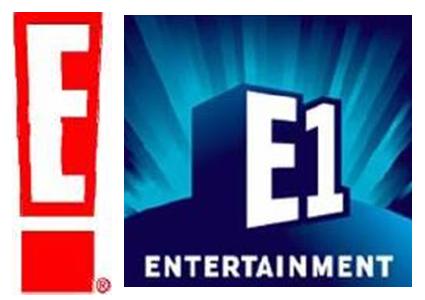Entries by Michael Atkins (1064)
Ninth Circuit Affirms Denial of E! Entertainment's Injunction Motion
 Not “identical, or nearly identical”:
Not “identical, or nearly identical”:
Plaintiff’s logo (left) and defendants’ logo
Last year, E! Entertainment Television, Inc., sued Entertainment One GP Limited, d/b/a E1 Entertainment, and four related entities in the Central District of California for trademark infringement.
E! Entertainment operates television networks and owns a number of “E!” design marks.
The Entertainment One defendants distribute third-party CDs and DVDs; operate a record label; and own and distribute niche and direct-to-video movies. They conduct business in connection with an “E1” design mark, though only two of the five defendants have ever used the mark in the United States.
E! Entertainment moved for a preliminary injunction.
The court denied the motion, finding:
- E! Entertainment did not show that the parties’ marks are similar;
- The parties do not compete with respect to the same goods or services;
- E! Entertainment did not present any evidence showing that its customers — primarily casual television viewers — exercise a low degree of care, whereas defendants demonstrated their customers exercise a high degree of care;
- There is widespread third-party use of “E” marks in the entertainment field;
- Consumers are not likely to be confused by defendants’ “E1” marks; and
- E! Entertainment did not present any evidence of actual confusion.
E! Entertainment appealed these findings.
On Jan 26, the Ninth Circuit affirmed, concluding the district court did not err in finding there was no likelihood of confusion.
The court added: “We have held that a party seeking relief under 15 U.S.C. § 1125(c) must demonstrate that the marks are ‘identical, or nearly identical,’ so that a ‘significant segment of the target group of customers sees the two marks as essentially the same.’ We conclude that the district court did not err in finding that the parties’ respective marks are not nearly identical under this standard.”
The case cite is E! Entertainment Television, Inc. v. Entertainment One GP Limited, 2010 WL 331505, No. 09-55937 (9th Cir. Jan. 26, 2010).
Court Finds Logo Either Protected as Parody or Not Likely to Cause Confusion
![]() No TRO: Plaintiff Protectmarriage.com’s logo (left)
No TRO: Plaintiff Protectmarriage.com’s logo (left)
and defendant Courage Campaign’s derivative logo
“[P]laintiff is unlikely to overcome the conclusion that defendant’s use of the mark is protected under the First Amendment….”
That’s the conclusion the Eastern District of California reached Jan. 20 in denying plaintiff Protectmarriage.com - Yes on 8’s motion for a temporary restraining order against defendant Courage Campaign’s use of an allegedly infringing logo.
Protectmarriage.com supports traditional marriage and helped place California’s Proposition 8 on the ballot. Its logo depicts a man and a woman with two kids.
Courage Campaign supports same-sex couples’ right to marry. Its logo is derived from Protectmarriage.com’s logo. It depicts two women with two kids.
Protectmarriage filed suit against Courage Campaign and sought a temporary restraining order prohibiting Courage Campaign from using its logo. Courage Campaign opposed the motion on the ground its logo is protected parody.
The court found found Courage Campaign’s logo is either protected by the First Amendment or is not likely to cause confusion. Either way, the court found Protectmarriage.com is unlikely to succeed on the merits of its infringement claim.
“In this case, the logo itself is artistic,” the court said. “Moreover, the broader website, while perhaps not artistic, is undeniably expressive of a political idea, and both political and artistic expression are protected by the First Amendment. Defendant’s use of the mark has relevance to the expressive message, namely, support for homosexual marriages, and specifically, opposition to recent California efforts to limit the right to such marriages. This support is expressed by the modification of the ‘father’ figure in the original mark to depict a second ‘mother.’ Further, the mark does not explicitly mislead as to the source of the work. Any potential for confusion or misdirection is obviated by the images and text that uniformly accompany defendant’s use of the mark, namely, photos of homosexual couples together with text explicitly endorsing homosexual marriage. Plaintiff is unlikely to succeed in showing that a visitor to the [defendant’s] prop8trialtracker website is likely to be confused as to whether plaintiff is affiliated with the site.”
The case cite is Protectmarriage.com - Yes on 8 v. Courage Campaign, __ F.Supp. __, 2010 WL 325571, No. 10-132 (E.D.Cal. Jan. 20, 2010).
Paccar Seeks Default Judgment Against Replica Model Truck Maker
 Plaintiff Paccar’s PETERBILT truck trade dress (left)
Plaintiff Paccar’s PETERBILT truck trade dress (left)
and defendant Malibu International’s replica scaled model truck
Last April, Bellevue-based Paccar Inc. sued former licensee Malibu International Limited for infringing its trade dress by selling replica scaled models of Paccar’s KENWORTH and PETERBILT trucks without permission.
Its complaint alleged: “Defendant is currently selling or in the past has sold, without license, scaled model trucks that are knock offs of scaled model KENWORTH and PETERBILT trucks within the United States. The knock offs are substantially identical to previous model trucks sold by Defendant pursuant to license. Defendant or its manufacturer has altered these scaled model trucks so that they are substantially identical to the prior licensed scaled model trucks sold, except that the PETERBILT and KENWORTH trademarks no longer appear on them. Otherwise, the unique and distinctive design characteristics of each of the brand’s respective trucks has remained substantially the same, making them recognizable to the relevant public.”
Malibu didn’t appear or answer, so on Dec. 23, the Western District deemed it to be in default.
Today, Malibu moved for entry of a default judgment and permanent injunction. If granted, the injunction would enjoin Malibu from infringing Paccar’s trademark rights and compel it to deliver for impoundment and destruction all of its infringing goods.
The case cite is Paccar Inc. v. Malibu International Ltd., No. 09-477 (W.D. Wash.).
Western District Transfers Leather Product False Advertising Case to Ohio
STL regulars may remember the false advertising and product disparagement case that Design Resources, Inc., brought last year against defendants Leather Industries of America, Inc., and Nicholas Cory.
The complaint alleged Dr. Cory, who tested Design Resources’ NEXTLEATHER product at the Leather Research Laboratory, a Leather Industries affiliate, advised Design Resources that the product could be called “bonded leather,” and then proceeded to disparage the labeling, marketing and selling of the product as “bonded leather.”
Defendants moved to dismiss or transfer venue pursuant to Rule 12(b)(3).
On Jan. 21, Western District Judge Ricardo Martinez granted the motion in part and transferred the case to the Southern District of Ohio.
The court found: “The entire focus of these allegations is Dr. Cory, his testing of DRI’s product, and his subsequent statements — all of which occurred in Ohio, where Dr. Cory resides and where the LRL testing laboratory is located. DRI asserts that it ‘came to Dr. Nicholas Cory and his and LIA’s laboratory, Leather Research Laboratory (‘LRL’), for th testing…’ Dr. Cory has established by his Declaration that he has never visited Washington State, nor does he own property or maintain a bank account in this State. The only evidence offered by DRI in opposition to the Rule 12(b)(3) motion are invoices sent by LRI to DRI for the work performed by Dr. Cory at LRL in Ohio. These invoices are wholly insufficient to establish that a ‘substantial part’ of the events giving rise to this action occurred in Washington.”
The court found that Design Resources could have brought the action in the Southern District of Ohio, where Dr. Cory resides and where the testing took place. The court, therefore, decided to transfer the action there rather than dismiss it.
The case cite is Design Resources, Inc. v. Leather Industries of America, Inc., No. 09-00611 (W.D. Wash. Jan. 21, 2010).
Ninth Circuit Affirms Attorney's Fees Award Against Injunction Violator
On Jan. 11, the Ninth Circuit affirmed the Central District of California’s award of $29,730 in attorney’s fees to plaintiff RRLH, Inc., stemming from defendant Hendrick Barto’s violation of the court’s order prohibiting him from using plaintiff’s LIESURE WORLD trademark. Mr. Barto did business as Leisure World Resales, Inc.
“Spending seventy-eight hours filing and prosecuting the contempt motion was reasonable in light of the distance between their attorney’s office and the courthouse, Barto’s unauthorized filings, and Barto’s opposition to the contempt motion,” the court found. “The hourly rate RRLH’s attorneys charged was also reasonable given their expertise, qualifications, and the rates charged by comparable attorneys.”
In March 2008, the district court found that Mr. Barto had acted in bad faith in violating a previous court order.
The order was a stipulated judgment enjoining Mr. Barto from using “Leisure World” as part of his company name and withdrawing his application to register LEISURE WORLD with the Patent and Trademark Office.
RRLH, Inc. v. Barto, 2010 WL 178724, No. 08-56071 (9th Cir. Jan. 11, 2010).